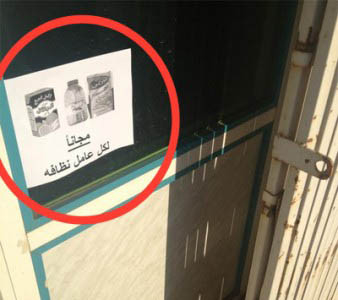
Manama: Social networks in Saudi Arabia have heaped praise on a grocery store for offering free water and fruit juice to street cleaners.
The bottle and packet offer was indicated in a poster on the door of the store in the northern city of Hael.
“This is a wonderful idea and we fully support it,” Mohsin Al Awlaqi, a blogger, posted. “It reminds me of the call by another store to help pay the debts of widows and divorcees,” he said in remarks published by local Arabic daily Al Madina.
“We welcome the idea and we should build on it,” Ebrahim Al Suwailam, another blogger, said. “Next time you are at a restaurant, please take whatever you could not consume and offer it to a street cleaner, a worker at the petrol station or a labourer.”
Blogger Najeed wanted the pro-cleaners sympathy to spread in the Saudi capital Riyadh and said that all stores should make water available to all labourers.
“There is constant work in Riyadh and people should have easy access to water,” he posted.
For blogger Omar Al Tamimi, small gestures could have special significance. “Next time you go to a public place, take with you lots of bottles of water. Some people do need them,” he posted.
In his comments, Hayem Al Dossary said that people should contribute to providing mosques with chairs for old and physically-challenged worshippers to help them perform their prayers.
“You can also make it a habit to leave water for birds and animals,” he posted.
The wave of sympathy triggered by the shop sign has reportedly reached family circles.
“Smile in the face of your wife, kiss your mother’s head, help your father, give money to your brother, sit with your sister and playfully tease her,” Musallam Al Thabeeti said.
Charity acts are common among local and expatriate communities, but they gain an impressive significance during Ramadan, the lunar calendar month venerated by Muslims.
Saudi Arabia is home to around nine million foreigners, mainly unskilled labourers and domestic helpers from Asian countries.
Foreigners make up around one-third of the total population.












